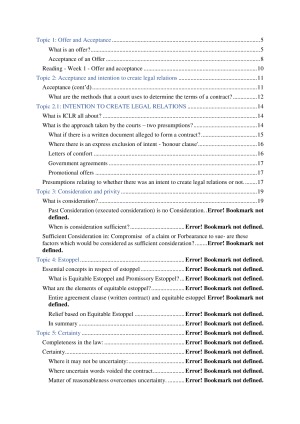Contract Law A notes
Subject notes for LaTrobe LAW2CTA
Description
Topic 1: Offer and Acceptance 5 What is an offer? 5 Acceptance of an Offer 8 Reading - Week 1 - Offer and acceptance 10 Topic 2: Acceptance and intention to create legal relations 11 Acceptance (cont’d) 11 What are the methods that a court uses to determine the terms of a contract? 12 Topic : INTENTION TO CREATE LEGAL RELATIONS 14 What is ICLR all about? 14 What is the approach taken by the courts – two presumptions? 14 What if there is a written document alleged to form a contract? 15 Where there is an express exclusion of intent - 'honour clause' 16 Letters of comfort 16 Government agreements 17 Promotional offers 17 Presumptions relating to whether there was an intent to create legal relations or not. 17 Topic 3: Consideration and privity 19 What is consideration? 19 Past Consideration (executed consideration) is no Consideration. 22 When is consideration sufficient? 25 Sufficient Consideration in: Compromise of a claim or Forbearance to sue- are these factors which would be considered as sufficient consideration? 28 Topic 4: Estoppel 31 Essential concepts in respect of estoppel 31 What is Equitable Estoppel and Promissory Estoppel? 34 What are the elements of equitable estoppel? 39 Entire agreement clause (written contract) and equitable estoppel 43 Relief based on Equitable Estoppel 43 In summary 44 Topic 5: Certainty 45 Completeness in the law: 45 Certainty 47 Where it may not be uncertainty: 47 Where uncertain words voided the contract 48 Matter of reasonableness overcomes uncertainty. 49 Agreements to negotiate in good faith 49 Agreements subject to contract - non-binding agreement can be enforceable 50 Topic REQUIREMENT OF WRITING IN CONTRACTS 53 Starting point: Contracts in Common Law don't need to be in written form. 53 Focus on the requirement of writing in land transactions. 54 What are the interests in land which are covered? 54 What are the required terms? 55 The enforcement of contracts in equity where they are not enforceable as there is a failure to comply with statutory requirements. 55 What is the Australian version of the doctrine of part performance? 56 Topic 6: Expressed Terms 59 Terms and representations 60 Difference between term and representation: 60 Incorporation of terms by signature 61 Regardless if you read it or not, the contract is binding if you sign. 62 Other documents with terms incorporated: 62 Exceptions to the signature rule. 63 Incorporation of terms by notice 64 Case Examples: 64 Incorporation of terms by prior dealings 66 Parol Evidence Rule 66 The operation of an entire agreement clause. 68 Collateral contracts 69 Elements of a collateral contract: 69 Promissory nature of a collateral contract. 70 Whether it was a term given by the seller or an expression of opinion 70 That there should be no inconsistency between the main contract and the collateral contract. 70 Entire Agreement clauses affecting collateral contracts: 71 Pre-contractual statement giving rise to an equitable estoppel 71 Topic 7: Implied terms 71 Courts won't imply terms at the drop of a hat 72 How then do you imply terms on the facts of a case? 73 5 indicators (not required elements) for what a reasonable person would have 75 Informal contracts 78 Implication of terms by law 78 Implication of terms by custom 80 Is there an implied term of good faith? 81 The application of the implied term 82 The meaning of a term 83 If there is no good faith then there would be bad faith? 83 3. The exclusion of a term 84 Topic 8: Construction of contractual terms 84 Construction of contractual terms 84 Process of interpretation 85 Intention is important 85 The objective determination of intention? 86 The principles of construction 88 Use of dictionaries 90 Parol Evidence and the Construction of Contracts 90 Exclusion clauses and extrinsic evidence 91 Inadmissible evidence 91 How about post-contract conduct? 91 Topic 9: Discharge by performance 92 Discharge by performance - Time performance of Obligations 93 Order of performance of contractual obligations 93 Co-operation, good faith and performance 94 Level of performance required to discharge a contract 94 Divisible contracts 95 Obstruction of performance 96 Substantial performance 96 Acceptance of partial performance 97 Topic 10: Discharge by Agreement 97 There are several ways of discharge by agreement 97 (1) Discharge by abandonment 98 (2) Discharge pursuant to a term of the original contract 98 Conditions subsequent 99 (3) Discharge by subsequent agreement 99 Discharge of executory contracts by a subsequent agreement 101 Discharge of executed contracts by a subsequent agreement 101 Discharge by breach 103 Topic 11: Discharge by breach (cont’d) and Frustration 107 Contractual right to terminate 107 Repudiation 108 Effect of termination. 109 Restrictions on termination 109 Party not ready, willing and able or in breach 110 Election. 110 If the termination is not done in good faith 111 Relief against forfeiture 111 Discharge by Frustration 111 How frustration can be handled: 111 Elements of Frustration: 112 Frustrating events 112 Events not frustrating: 113 The effect of frustration 113
LaTrobe
Semester 1, 2016
113 pages
49,402 words
$49.00
Campus
LaTrobe, Melbourne (Bundoora)
Member since
March 2016
